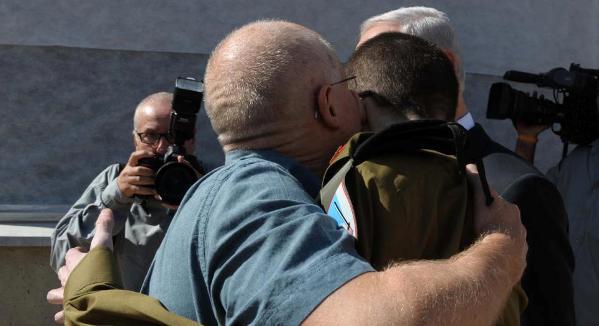
by Andi Arnovitz
Synchronicity: On the Rescue of Gilad Shalit
 There is much too much synchronicity in the air right now. It’s hard to breathe. I am desperate for a mundane randomness in events but I find everywhere I turn there is a plethora of parallels, of metaphors; an abundance of symbols. There is no escaping the weight of the times in which we are living: one too many coincidences are no longer coincidences.
There is much too much synchronicity in the air right now. It’s hard to breathe. I am desperate for a mundane randomness in events but I find everywhere I turn there is a plethora of parallels, of metaphors; an abundance of symbols. There is no escaping the weight of the times in which we are living: one too many coincidences are no longer coincidences.
Tuesday Gilad Shalit is due to return home.
Being an artist, with a vivid imagination, I have spun many moments for him in my head:
The cacophony of Hebrew pummeling his ears for the first time in five years.
The physical pain of daylight.
The peculiar and personal smell of his father’s neck.
More of something. Anything.
Music.
Privacy
Eating his favorite cake, a cake which surely Aviva is baking for him, measuring slowly, carefully, sifting the flour and sugar, crying, the salt from her tears a just substitute for the table salt the recipe requires. Wondering, as she stirs and mixes, what she will find, what sort of son is being handed back to her now, and where in the book of mothering are the directions for what lies ahead?
Is it not perfectly fitting this is all happening during Sukkot? We Jews, leaving the comforts of our homes, camping out, trusting that the weather will hold, laughing in these temporary dwellings, flicking the ants away from the challah and honey, watching the paper decorations curl from the morning moisture? Not home, but close enough, secure that it lies just there, through the back door.
And the Shalits, Aviva and Noam, when they set up their sukkah, their protest tent outside the prime minister’s house, in March 2009 , did they have any idea that that sukkot would last for years? That they would indeed be welcoming Ushpizin, but of the political, not the biblical kind. And when they left it, a few days ago, when they took it down , pole by pole, and returned to their home in Mitzpe Hila , did they feel the relief of return, the exhaustion of their vigil weighing in on them like forty years of helpless wandering? What is like to walk back through your door after all that, to wake in your own room and, with freshly laundered sheets in hand to make the bed of the boy you thought you might never, ever hold in your arms again?
Temporary.
Life is so temporary.
When, in the course of five years, did he perhaps doubt and start thinking he was deserted by us?
Was he in a room?
A dungeon?
Did he have heat? A cranky fan in the thick August hamsin… A pillow for his head?
Does he know it is Sukkot?
Is it possible his sojourn is almost over?
He will move back to his home and we will move back into ours Wednesday night. His return will be deeper, richer, infinitely more painful than ours. He will not believe his eyes, nor trust his hands or the smells so familiar. It might be too much. I pray not.
And then there is the matter of time.
Tuesday night the Israel Museum in Jerusalem is showing Christain Marclay’s “The Clock” all night long. As an artist, I longingly read about this film, this mega-work: I read the reviews from New York, London, Venice, oh how I wanted to see this twenty-first century cinematic commentary on time and how we humans deal with it. And here it comes, to Israel, putting us quite rightly on the cultural map~
And so, Tuesday night I will sit and watch this epic art piece about time with many other Israelis and I will feel the way I did on my first viewing: amazed, despondent, mesmerized, unable to help feeling there is a futility in the whole human enterprise. And at some point, since it will run all night, I will have to stop and leave, and go home. And I will wonder what exactly I missed….
What did he miss?
And while I am watching, Aviva and Noam will be watching a very different sort of drama, but also, painfully, explicitly about the passage of time. What does five years of deprivation, of hopelessness and God knows what do to someone? They will be watching their son.
Watching.
Counting.
Waiting.
Marking time.
The waiting for him to return home will now be replaced by the waiting for him to return to himself, for the nightmares to recede, for trust to take root again. The waiting will be displaced to the rest of us as we hold our breath dreading the next captured soldier. And what will the ante be next time?
I only know this:
The idea of home, of shelter, the concept of time, the cycles and seasons the rituals, both communal and personal, and even faith, are all that we have. It is these small moments of blessed simplicity, the breeze blowing through our sukkah, the carefully baked cake for the people we love, the leaving of what is familiar and the grateful return to it once again that makes us human. I trust that the more we see the parallels, the more we can imagine what someone else is feeling, the better off we are, the finer we become. Home has never, ever meant so much.
~Andi Arnovitz
Jerusalem October 2011